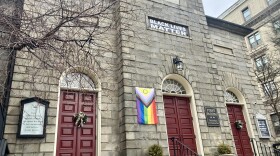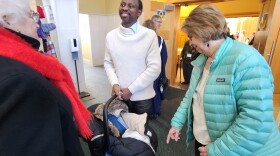Imagine getting a call that you are related to a freedom fighter from the 18th century. That's what happened to Lisa Shepperson, age 58, who recently learned she is a descendant of Elizabeth Freeman.
“I am so elated about it. It’s such a blessing,” she said, standing next to Freeman's grave in Stockbridge, Massachusetts, this week.
Freeman was a woman of African descent who was enslaved in Sheffield from about 1758 until 1781, when she won a lawsuit for her freedom. This week is the anniversary of when a jury in Great Barrington decided she was not the legal property of John Ashley, the man who had enslaved her.
Lisa Shepperson is a certified nursing assistant from Richmond, Virginia. When American Ancestors, a nonprofit genealogical society, spoke with her in April and explained that she is Elizabeth Freeman's sixth great granddaughter, Shepperson thought it was a scam.
But during her visit to the Berkshires this week, she said she is grateful to learn she is related to Freeman.
“I’m so proud of her. There is nothing more important than taking a stand for what you believe. You believe it, you can do it," Shepperson said.
American Ancestors flew Shepperson to the area where she visited several landmarks that help tell Freeman's story, including the Ashley House in Sheffield, where Freeman was enslaved, the site of the courthouse in Great Barrington where Freeman won her freedom and a statue of Freeman in Sheffield, unveiled in 2021.
She also met with Berkshire-resident Wray Gunn, a descendant of Agrippa Hull, who was a friend of Elizabeth Freeman.
This week Shepperson learned about the moment when Freeman walked away from the house where she was enslaved, to ask a lawyer, Theodore Sedgwick to represent her in a lawsuit for her freedom.
"The bravery in doing that in the middle of the night, in the dark and in the cold," Shepperson said.
Sedgwick agreed to represent Freeman and a man who was also enslaved, named Brom, in Brom & Bett v. Ashley. The case led to the end of slavery in Massachusetts. About a decade later no one reported to the census that they owned slaves.
Shepperson said she has something in common with Freeman.
"She was a healer and a caregiver, and I work that field today, " she said. "I work for a doctor's office... So I am that person, as well, just in a different form, in this day and time."
After her lawsuit, Freeman became the paid housekeeper for Sedgwick's family. She took care of his children and wife, Pamela, who suffered from depression. Outside of the household, Freeman also worked as a midwife.
One of Sedgwick's children, Catharine Maria Sedgwick, wrote down Elizabeth Freeman's story.
Lindsay Fulton, the chief researcher at American Ancestors, who helped identify Shepperson, said Freeman "left behind a pretty nice paper trail."
Freeman purchased nearly 19 acres in Stockbridge. Her deed and probate records helped researchers track down descendants.
Freeman had one daughter, also named Elizabeth, along with grandchildren and great grandchildren.
One great granddaughter, named Wealthy Ann Drean, married James Primus (or Prime), who fought for the union in the Civil War. The couple had a son, Joseph Primus (or Prime), who served in the same regiment as his father — the 29th infantry, Connecticut's first all black regiment.
Joseph left behind a pension that named his children: Bertha born in 1875 and Eva born in 1899.
"That brings us down to just about the turn of the century, 1900," Fulton said.
Eva had a child named Reginald Baldwin who married Clara Watson. They had a daughter named Margaret. In 2023, the researchers found a short announcement that Margaret Howard (nee Baldwin) had died.
"We called the funeral home in Connecticut and asked them to share our phone number with any of the next of kin," said Fulton. That's how they got in touch with Shepperson.
The research is part of "10 Million Names," American Ancestors' genealogical project that is searching for the names of all the people who were enslaved in the U.S. between 1500 and 1865, and their descendants.
Shepperson, who didn't know Freeman's history until recently, said she has a lot to study and is bringing home some books to share with her grandchildren.
During much of her life, Freeman was known as Bett or Mumbet. After winning her lawsuit, she took the name 'Elizabeth Freeman.'
Shepperson questioned whether she should be called 'Mumbet' today. She said that's the name children would have used.
"That's not a name for adults to continue to use," she said. "That's what I want the world to know.... Her name is Elizabeth Freeman."
Shepperson said she plans to restore the inscription on Freeman's gravestone, which has worn away over time.









